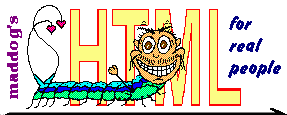 Chapter 4, Quiz
Chapter 4, Quiz Chapter 4, Quiz
Chapter 4, QuizIf you don't want to take the quiz, you can advance.
Here's your "confidence builder" for this chapter. Again, questions are presented in roughly the same order as the material in this chapter was presented, so you can quickly re-read part of the material, if you need to. You may check your answers by clicking in the appropriate box, or by going to the full answer page -here-
Which of the following is a tag pair for "bolding" text?
![]() <BOLD></BOLD>
<BOLD></BOLD>
![]() <EM></EM>
<EM></EM>
![]() <STRONG></STRONG>
<STRONG></STRONG>
![]() <CITE></CITE>
<CITE></CITE>
Which of the following is NOT a tag pair for italicizing text?
![]() <EM></EM>
<EM></EM>
![]() <CITE></CITE>
<CITE></CITE>
![]() <ITALIC></ITALIC>
<ITALIC></ITALIC>
![]() <I></I>
<I></I>
TRUE or FALSE: it is acceptable to close the <STRONG> tag using the </B> tag.
![]() True
True
![]() False
False
Which of the following tags allow underlining of text?
![]() <U></U>
<U></U>
![]() <UL></UL>
<UL></UL>
![]() <UNDERLINE></UNDERLINE>
<UNDERLINE></UNDERLINE>
![]() <STRIKE></STRIKE>
<STRIKE></STRIKE>
On some browsers, underlined text may be confused with:
![]() italicized text
italicized text
![]() bolded text
bolded text
![]() highlighted text
highlighted text
![]() links
links
Which of the following HTML tags does NOT automatically enable a fixed-spaced font?
![]() <BLOCKQUOTE></BLOCKQUOTE>
<BLOCKQUOTE></BLOCKQUOTE>
![]() <PRE></PRE>
<PRE></PRE>
![]() <CODE></CODE>
<CODE></CODE>
![]() <TT></TT>
<TT></TT>
Which of the following HTML tag pairs allows insertion of text without having to manually insert a '<BR>' tag for line breaks?
![]() <BLOCKQUOTE></BLOCKQUOTE>
<BLOCKQUOTE></BLOCKQUOTE>
![]() <PRE></PRE>
<PRE></PRE>
![]() <Code></Code>
<Code></Code>
![]() <TT></TT>
<TT></TT>
TRUE or FALSE: Browser "word-wrapping" is enabled inside the '<BLOCKQUOTE></BLOCKQUOTE>' tag pair.
![]() True
True
![]() False
False
Which tag implements the automatic indentation of a text passage?
![]() <P ALIGN="LEFT">
<P ALIGN="LEFT">
![]() <BLOCKQUOTE></BLOCKQUOTE>
<BLOCKQUOTE></BLOCKQUOTE>
![]() <PRE></PRE>
<PRE></PRE>
![]() <INDENT></INDENT>
<INDENT></INDENT>
Which of the following lines is an example of proper nesting of HTML tags?
![]() <TAG-A> text1 <TAG-B> text2 <TAG-C> text3 </TAG-A>
<TAG-A> text1 <TAG-B> text2 <TAG-C> text3 </TAG-A>
![]() <TAG-A> text1 <TAG-B> text2 <TAG-C> text3 </TAG-A> </TAG-B> </TAG-C>
<TAG-A> text1 <TAG-B> text2 <TAG-C> text3 </TAG-A> </TAG-B> </TAG-C>
![]() <TAG-A> text1 <TAG-B> text2 <TAG-C> text3 </TAG-C> </TAG-B> </TAG-A>
<TAG-A> text1 <TAG-B> text2 <TAG-C> text3 </TAG-C> </TAG-B> </TAG-A>
![]() <TAG-A> <TAG-B> <TAG-C> text1 </TAG-A> text2 </TAG-B> text3 </TAG-C>
<TAG-A> <TAG-B> <TAG-C> text1 </TAG-A> text2 </TAG-B> text3 </TAG-C>
Which of the following statements is TRUE about tag attributes?
![]() attributes can be embedded in either the opening or closing tag
attributes can be embedded in either the opening or closing tag
![]() the attribute name must be enclosed in quotation marks.
the attribute name must be enclosed in quotation marks.
![]() the browser has no access to attribute values
the browser has no access to attribute values
![]() attributes usually have a name and a value
attributes usually have a name and a value
Which of the following statements is NOT true about the 'PARAGRAPH' tag?
![]() the <P> tag will accept a modifying attribute
the <P> tag will accept a modifying attribute
![]() the <P ALIGN="RIGHT"> tag reverts to default alignment when it encounters another <P>
the <P ALIGN="RIGHT"> tag reverts to default alignment when it encounters another <P>
![]() When used with the <P> tag, the 'ALIGN=' feature has limited duration
When used with the <P> tag, the 'ALIGN=' feature has limited duration
![]() on most browsers, the <P> tag behaves exactly the same as the <P ALIGN="CENTER"> tag
on most browsers, the <P> tag behaves exactly the same as the <P ALIGN="CENTER"> tag
TRUE or FALSE: the <BIG></BIG> tag pair causes an automatic end-of-line action to be generated by the browser
![]() True
True
![]() False
False
TRUE or FALSE: When using the <FONT><FONT> tag pair with a 'SIZE' attribute, either specific or relative size may be controlled
![]() True
True
![]() False
False
The tag <FONT SIZE=+3> instructs the browser to:
![]() change the default font to "pico"
change the default font to "pico"
![]() change the current font to numerically specified font size '3'
change the current font to numerically specified font size '3'
![]() change the current font to 3 sizes larger than the previous font
change the current font to 3 sizes larger than the previous font
![]() change the current font to 3 sizes larger than the default font
change the current font to 3 sizes larger than the default font
TRUE or FALSE:For the tag <FONT SIZE=95>, the browser responds by providing the font at 'SIZE=7'
![]() True
True
![]() False
False
TRUE or FALSE: for each specific type of HTML tag pair used, there should be an identical number of opening and closing tags
![]() True
True
![]() False
False
Which of the following statements is TRUE about horizontal rules?
![]() the 'WIDTH' attribute specifies the number of pixels of vertical line width
the 'WIDTH' attribute specifies the number of pixels of vertical line width
![]() the 'SIZE' attribute can be specified as a percentage
the 'SIZE' attribute can be specified as a percentage
![]() When specifying a 'WIDTH' attribute, it's a good idea to also specify the 'ALIGN' attribute
When specifying a 'WIDTH' attribute, it's a good idea to also specify the 'ALIGN' attribute
![]() the horizontal rule states that the browser must abide by the horizontal alignment formula
the horizontal rule states that the browser must abide by the horizontal alignment formula
TRUE or FALSE: When included in the <HR> tag, the 'NOSHADE' attribute requires no '=' sign nor value.
![]() True
True
![]() False
False